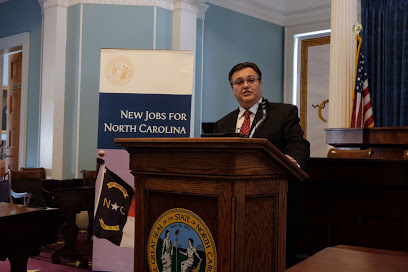
NC’s Gene Therapy Status Boosted by Cellectis Plan for $68.6M Cancer Immunotherapy Facility
North Carolina’s prominence in the global gene therapy race took another major leap forward today.
Paris-based biotechnology company Cellectis (NASDAQ: CLLS) announced plans to invest nearly $70 million and create 200 jobs in Raleigh, at what will become its first North American manufacturing facility.
Cellectis (pronounced SELECT-iss), a clinical-stage biopharmaceutical company developing a new generation of cancer therapies, said it plans to hire scientists, engineers, analysts, manufacturing and operations personnel to staff the facility, at salaries averaging $100,823. The average wage for all Wake County workers is $58,138.
"North Carolina is proud to be a national leader in life sciences,” said Governor Roy Cooper at a news conference in the Capitol building announcing the Cellectis project. “The cutting-edge cancer therapies that Cellectis will produce in Raleigh will continue to strengthen our role in biopharmaceuticals, as well as have a major impact in the battle against cancer.”
Engineering “off-the-shelf” T cells from healthy donors

company bringing 200 jobs to Raleigh.
Cellectis, founded in 1999, is among the high-profile biopharmaceutical companies that use gene editing to fight cancer in a new way. They engineer T cells – a type of immune system cell that recognizes invading germs or cancer cells – to carry a tumor-targeting weapon called a chimeric antigen receptor (CAR). These engineered cells have the potential to save the lives of many patients unresponsive to traditional chemotherapy and radiation regimens.
“Autologous” CAR T therapies currently on the market rely on patient-derived T cells. They are extracted and individually manufactured for each patient using that patient’s own cells. That’s a complex and lengthy process.
“Allogeneic” CAR T product candidates, on the other hand, use T cells derived from qualified healthy donors. These Universal CAR Ts or UCARTs, are manufactured in large batches and are frozen for shipment, storage and off-the-shelf use.

-- Cellectis video
Cellectis’s allogeneic CAR T product candidates rely on the company’s proprietary TALEN genome-editing platform to remove the T cell receptor to prevent rejection by the body – known as graft versus host disease -- without the need for donor-patient matching.
Cellectis has received FDA approval to conduct clinical trials for three different product candidates, targeting various forms of blood cancers such as leukemia.
The company offers a two-minute video on its website to explain how its gene edited CAR T cells work.
“Helping people living with certain types of blood cancers remains our core focus,” said Bill Monteith, senior vice president of U.S. manufacturing for Cellectis, addressing the news conference audience. He will oversee operations of the Raleigh facility.
“We hope that through the creation of this manufacturing facility in North Carolina that we will be able to bring cost-effective, accessible treatments to cancer patients in the very near future.”
Another strong partner in an important industry cluster
“Once life science companies like Cellectis understand the advantages that North Carolina offers to biomanufacturers, they’re eager to locate here,” said North Carolina Commerce Secretary Anthony M. Copeland. “This industry cluster is very important to us and we’re delighted that another strong partner will be taking advantage of the world-class talent, educational resources and important infrastructure elements available here.”

The North Carolina Department of Commerce and the Economic Development Partnership of N.C. (EDPNC) led the state’s support for the company’s expansion. The North Carolina Biotechnology Center provided technical due diligence in support of the recruitment, one of several major life science projects to be announced recently in which NCBiotech partnered.
“We are delighted that Cellectis chose to enter North America through North Carolina,” said Bill Bullock, NCBiotech senior vice president of economic development and statewide operations. “It stands as a vital affirmation for our state’s fast-growing ecosystem of gene therapy manufacturing and development excellence. In today’s highly competitive global environment for this elegantly specialized field, success begets success. Today’s announcement reflects that.”
Bullock noted in remarks at the news conference that a significant cluster of high-profile companies, including Locus Biosciences, Precision BioSciences, Pfizer, AveXis, bluebird bio, and now Cellectis, “are transforming leading-edge gene-editing technology into a new age of gene and cell therapies.”
Reinforces NC's solid French connection

“There is a 300-year tradition of friendship between France and America, and the arrival of Cellectis is one more step in the development and reinforcement of this solid relationship,” said Marie-Claire Ribeill, executive director of the Raleigh-based French American Chamber of Commerce of the Carolinas (FACCC).
“It is also a testimony of the hard work put in by all the teams of economic actors in North Carolina and the FACCC to highlight the incredible advantages to working and living in this state,” added Ribeill, who is also an honorary consul of France.
“FACCC is working actively to bring N.C. to the attention of the French business community, and was thrilled to work with NCBiotech toward locating and connecting with this new addition to our biotech landscape. We are looking forward to helping bring more French companies to this area. We are also a relay of the economic trends in France, where the new slogan is, ‘France is back,’ and we hope to work hand-in-hand with N.C. to capitalize on all of these new opportunities.”
State JDIG funding helps seal the deal
Cellectis’ expansion in Wake County will be facilitated, in part, by a Job Development Investment Grant (JDIG) approved by the state’s Economic Investment Committee earlier today. Over the course of the 12-year term of this grant, the project will grow the state’s economy by an estimated $1.4 billion.
Using a formula that takes into account the new tax revenues generated by the new jobs, the JDIG agreement authorizes the potential reimbursement to the company of up to $1,460,142, spread over 12 years. State payments only occur following performance verification by the departments of Commerce and Revenue that the company has met its incremental job creation and investment targets. JDIG projects result in positive net tax revenue to the state treasury, even after taking into consideration the grant’s reimbursement payments to a given company.
Because Cellectis chose to locate in Wake County, classified by the state’s economic tier system as Tier 3, the company’s JDIG agreement also calls for moving as much as $666,500 into the state’s Industrial Development Fund – Utility Account. The Utility Account helps rural communities finance necessary infrastructure upgrades to attract future business. Even when new jobs are created in a Tier 3 county such as Wake, the new tax revenue generated through JDIG grants helps more economically challenged communities elsewhere in the state. More information on the state’s economic tier designations is available on the N.C. Commerce website.
Besides N.C. Commerce, the EDPNC and NCBiotech, partners on the Cellectis project were the North Carolina General Assembly, the North Carolina Community College System, Wake County, the Greater Raleigh Chamber of Commerce, the City of Raleigh, and the Capital Area Workforce Development Board.
“This state-of-the-art facility will reflect our cutting-edge advances in manufacturing sophisticated gene-edited cell therapies at a commercial scale,” said André Choulika, chairman and CEO of Cellectis.
“We benchmarked several locations within North Carolina and in other states and selected Raleigh, which combined multiple advantages, including a strong state support and willingness to welcome world-class innovative companies. Cellectis' priorities are very much aligned to North Carolina's and we are pleased with this partnership to write this new page of our history.”
